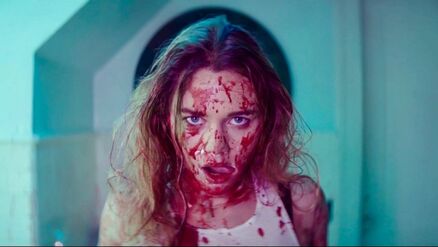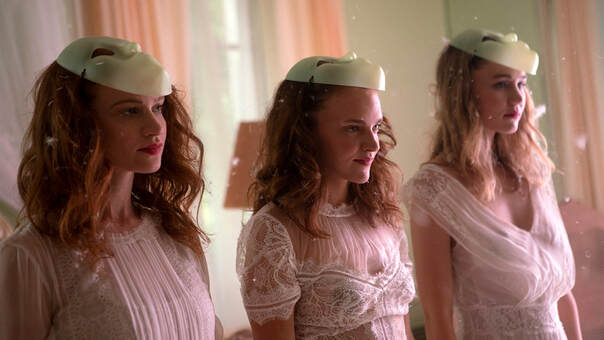 Childhood friendships among girls are strange beasts. ...Either they’re made of steel and completely unshakeable, or they crumble even as they form. No matter how strong they are, though, they’re also violent. Violent emotions, violent words, sometimes even violent actions. The more intense the friendship, the higher the violent potential. But young girl’s rage rarely translates into physical action. Girls are more about pressure, isolation, and manipulating you down to their will. All children, because they’re still learning to navigate social graces adults play at having, are more direct with their attacks—whether they mean to be or not—and almost all childhood games are structured around a social power dynamic. Where you fall in the game often reflects less who you imagine yourself to be, and more where you actually stand in the group hierarchy. There is no better revealer of truth than a mask, and few better masks than a fantasy world where you have all the control. WARNING: SPOILERS AHEAD Writer/director Mitzi Peirone’s Braid is a fantastic showcase of the power dynamics and intense emotions wrapped in a female friendship rooted in control and fantasy. Petula (Imogen Waterhouse), Tilda (Sarah Hay), and Daphne (Madeline Brewer) have been friends since childhood. Daphne is the most eccentric, controlling one of the group, even as an adult. When Petula and Tilda return to Daphne in search of help averting a dangerous situation they discover she never left the fantasy world she created for them as children. Indeed, she even went so far as to create house rules to foster the game’s continuation. The only way to get what they want from Daphne is to play the game through to the end. By her rules, on her terms. Daphne has largely lost sense of the distinction between what’s real and what’s a part of the game, likely in part because of a trauma she suffered as a child and because she seems to have led a very sheltered life. She’s rich, she has virtually no need for the world outside of her sprawling estate. The game at the center of the film is a common one for childhood carried out to a twisted though still recognizable extreme. Daphne is Mother, Tilda is Daughter, and Petula is Doctor, making a house call to give the daughter a physical. The evolution of this game from likely harmless though annoying occurrence (they play every day until Daphne is accidentally pushed out of the treehouse) to psychosexual trap is traceable in the film’s back burner, though there is always some question as to its intensity. Daphne has been obsessive about Tilda and Petula since childhood, and her trauma seems to have done little to dampen her fixation. Their feelings about her are…uncertain for much of the film. They agree not to turn each other in when the doctor asks what happened, but they also agree to play the game for their protection and survival as adults. They fall into their usual roles with no hesitation and no missed steps, such that eventually we as viewers aren’t quite sure where the game ends and they begin. Even in revisiting for this piece the one thing I was most certain of was what an intensely queer experience it is. Much like 1994’s Heavenly Creatures, Braid centers on a group of girls who are (or seem) inseparable in childhood, one of whom is unable and unwilling to separate the fantasy of their structured game from the chaos of her disintegrating life. The world of Mother/Daughter/Doctor is the only world where things make sense for her, and any risk to the continuation of that world is to be eliminated. Daphne is likely the most sheltered of the three and probably originally used the game as a way to build connection from her state of isolation. Even when she goes to the hospital post-treehouse fight, we do not see her parents, off-screen, receiving news she might be too young to fully grasp. However she landed when she fell, it’s unlikely she’ll ever have children. At no more than 8 or 10, she’s barren. The only place she can have a child is in her fantasy world with Tilda and Petula. Daphne’s trauma doesn’t stop the friendship or the game. In fact, it only increases her fixation and the length she’s willing to go to make real the dream life she always wanted. Left to her own devices, living alone in a house she doesn’t even notice is falling apart, there is no other life for her outside of the game. She is the town madwoman, misunderstood, isolated, and abandoned in a sprawling landscape she isn’t sure how to take care of. Until Tilda and Petula show up, that is. Once the three of them are reunited Daphne’s world is colored and whole again, and vibrantly so. She accepts her role as town outcast, weaponizes it against people who aim to invade her space and break the ties between her, Petula, and Tilda. The game’s evolution from one of motherhood and caretaking to one with an element of illicit sexuality allows Daphne a space to explore what her feelings for the other girls may really mean. She’s always felt a connection, but how deep does it run? Tilda has always been Daughter, firmly under her Mother’s wing and control. Petula has always been Doctor, the strong and reassuring outside force that sweeps in to heal and comfort. The frame of the game may be heteronormative—Doctor for all intents and purposes is male, eventually “impregnating” Daphne after a sexual encounter in the kitchen—but that doesn’t make the reality heteronormative. In reality, this encounter happens between two women, and serves only to satisfy Daphne. It is both a way to cope with the trauma of the unattainable thing she so desperately wants—her bathroom cabinet is filled with pregnancy tests—and a way to explore her desire without fear of judgement or interference. Everything in the house and about the game is to serve Daphne, true, but the deeper into the film we get, the more we begin to see hints that she may not be the only willing participant. In fact, we discover the now much more twisted game of Mother/Daughter/Doctor has evolved once more into a cyclical game of cat and mouse. But now there’s only one mouse and two cats at play. It’s never clear how long this new iteration has been going on, only that it seems never to stop. The women, bound together by another act of violence—this time fully intentional and with all three participating against an interloper who would have separated them—have bonded ever closer, all three sleeping tangled up in one another, napping in a tub together, sharing an admittedly childlike celebratory dinner of candy and cupcakes post-victim disposal. Women’s rage, brutal, bloody, buried, and coated in sugar. The cinematography of the film shifts between black and white, dark and muted, and fantastically bright palettes, and the violence is always full color. So, too, the sensual encounters. Sex and violence, according to Braid, are not just a man’s taste. Petula and Tilda never truly leave their roles as Doctor and Daughter, and Daphne never sees herself as anything other than lover and Mother, but somewhere along the line things get a little blurred. Alliances we think we understand at the start shift around by the end so we’re not sure who stands where. The only thing we know for sure by Braid’s end is that we’re not sure of anything. These women are inexorably tied together to the end of time, determined, it seems, to act out their fantasy world with ever higher stakes and only one conclusion: this world they make together is the only one they’ll be safe and cared for in. The chosen family is the strongest family. They are the only ones who understand. By Katelyn Nelson
0 Comments
Leave a Reply. |
Archives
March 2023
|

 RSS Feed
RSS Feed